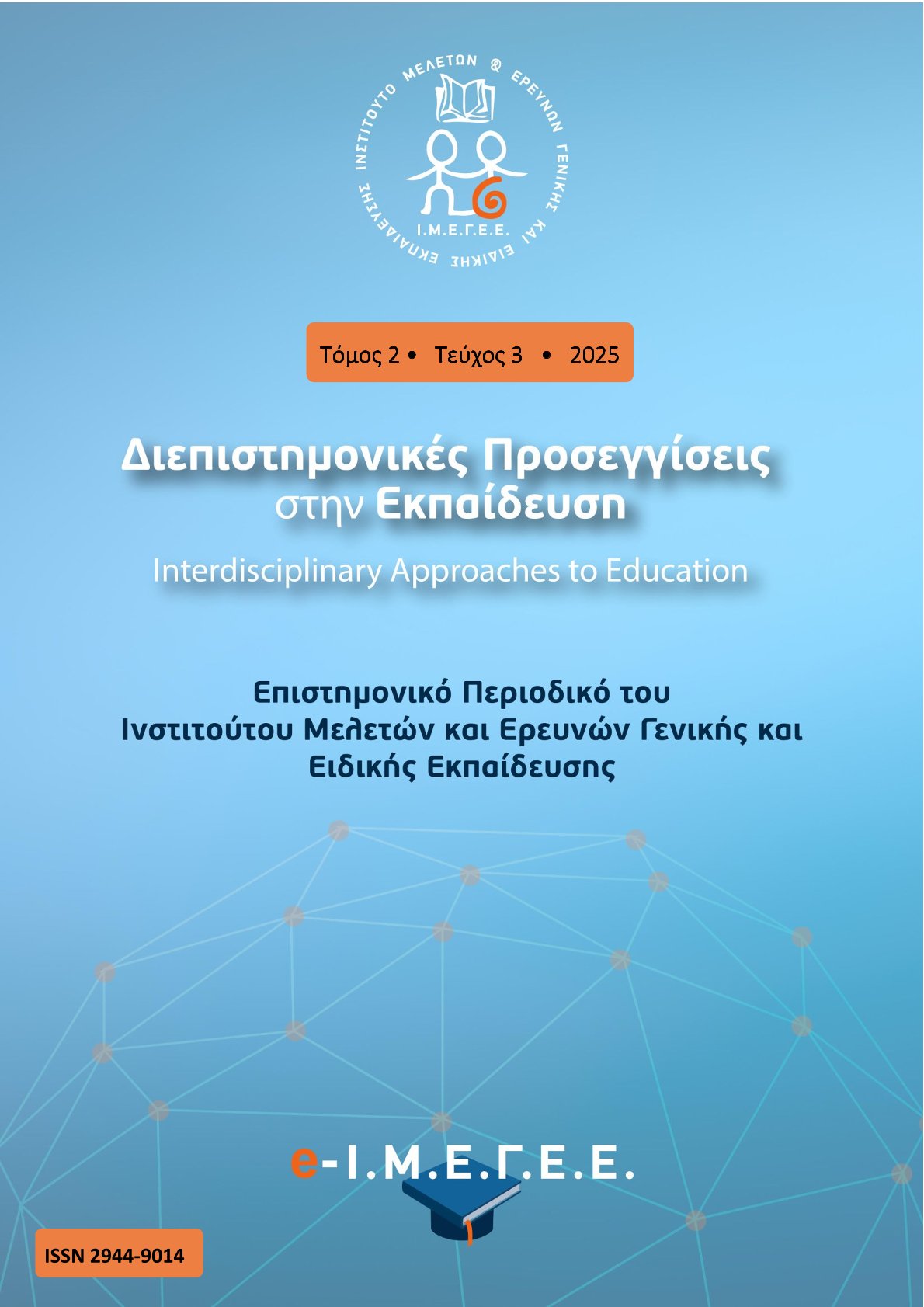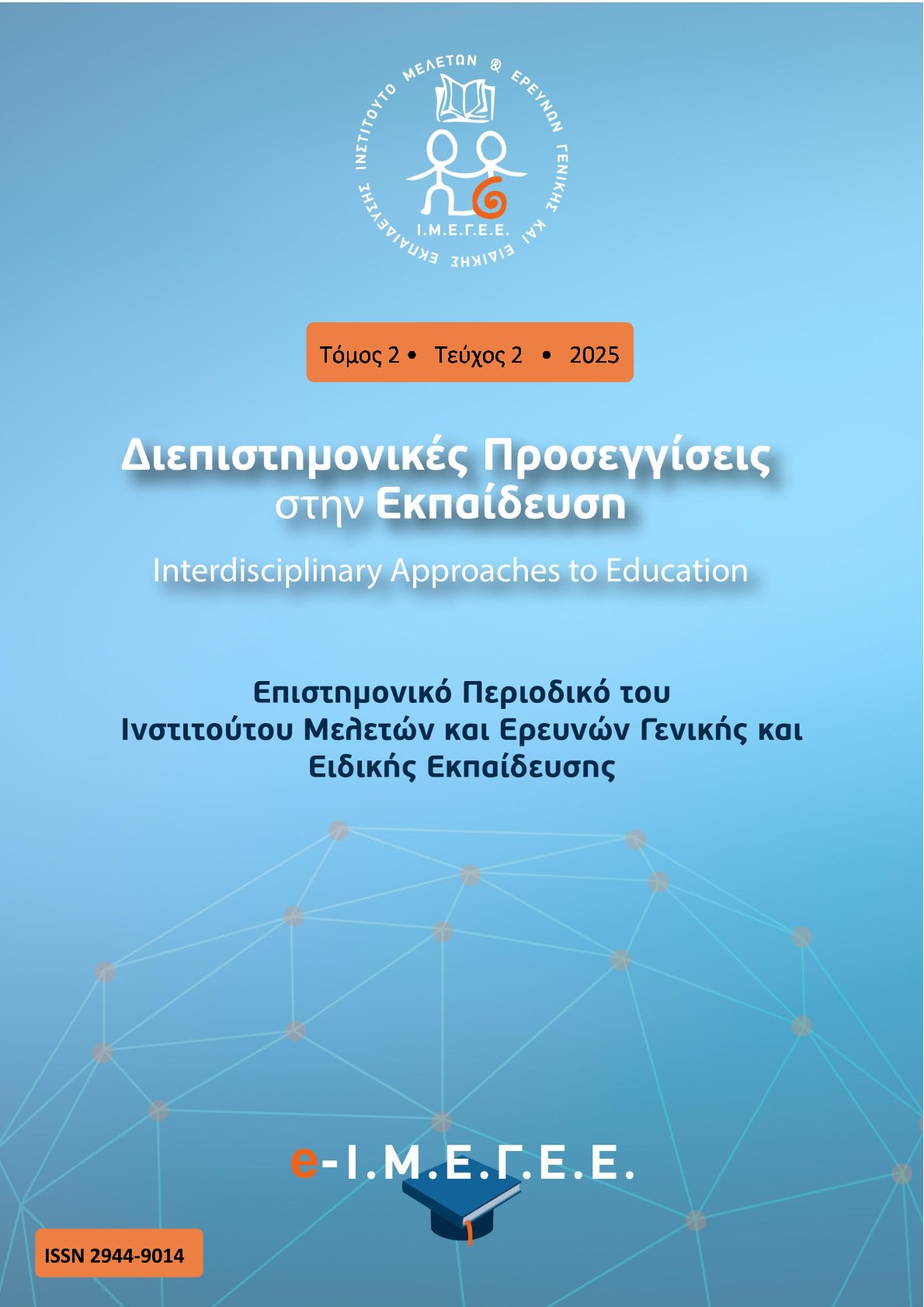Τεχνητή Νοημοσύνη και Ειδική Αγωγή και Εκπαίδευση: Η Συμβολή των Κοινωνικών Λειτουργών στον Εξατομικευμένο Εκπαιδευτικό Σχεδιασμό

Περίληψη
Η Τεχνητή Νοημοσύνη (ΤΝ) μετασχηματίζει διαρκώς τις παιδαγωγικές και κοινωνικές πρακτικές, επηρεάζοντας ιδιαίτερα την υποστήριξη παιδιών με Ειδικές Εκπαιδευτικές Ανάγκες (ΕΕΑ). Η εισαγωγή της ΤΝ στο σχεδιασμό Εξατομικευμένων Εκπαιδευτικών Προγραμμάτων προκαλεί αισιοδοξία για την ακρίβεια και την αποτελεσματικότητα, αλλά και επιφυλάξεις για ηθικά, τεχνικά και ανθρωπιστικά ζητήματα. Η μελέτη αποσκοπεί στην αποτύπωση των απόψεων των κοινωνικών λειτουργών σχετικά με τη χρήση της ΤΝ στο πλαίσιο σχεδιασμού και υλοποίησης υποστηρικτικών και εκπαιδευτικών παρεμβάσεων για παιδιά με ΕΕΑ και τις οικογένειές τους. Δίνεται έμφαση στη διερεύνηση των προσδοκιών, των επιφυλάξεων και των θεσμικών/ηθικών αντιλήψεων των κοινωνικών λειτουργών για την αξιοποίηση της ΤΝ στη σχολική κοινωνική εργασία. Η έρευνα υιοθέτησε ποσοτική προσέγγιση με περιγραφικό σχεδιασμό, αξιοποιώντας ως εργαλείο ένα δομημένο ερωτηματολόγιο κλειστού τύπου. Στην έρευνα συμμετείχαν 100 κοινωνικοί/ές λειτουργοί που δραστηριοποιούνται σε σχολικές μονάδες και δομές ειδικής αγωγής και εκπαίδευσης στην Ελλάδα. Η συλλογή δεδομένων πραγματοποιήθηκε διαδικτυακά μέσω πλατφόρμας Google Forms, μεταξύ Απριλίου και Μαΐου 2025. Οι συμμετέχοντες/ουσες επιλέχθηκαν με δειγματοληψία ευκολίας. Αξιοποιήθηκε περιγραφική στατιστική ανάλυση. Οι συμμετέχοντες/ουσες αναγνώρισαν τα πλεονεκτήματα της ΤΝ, όπως η βελτίωση της διαγνωστικής ακρίβειας, η εξατομίκευση των παρεμβάσεων και η διευκόλυνση της διαχείρισης εκπαιδευτικών προγραμμάτων. Ταυτόχρονα, εκφράστηκαν ανησυχίες για την προστασία προσωπικών δεδομένων, τις ηθικές προεκτάσεις, την επαγγελματική επάρκεια και τον κίνδυνο απανθρωποποίησης της σχέσης υποστήριξης. Η ΤΝ θεωρείται εργαλείο με σημαντικές δυνατότητες, υπό την προϋπόθεση ύπαρξης παιδαγωγικά ευαίσθητων ηθικών πλαισίων και θεσμικής κατοχύρωσης. Η συνεχής επιμόρφωση, η διαφάνεια στη χρήση και η τεχνολογία ως ενίσχυση – όχι υποκατάσταση – της ανθρώπινης σχέσης προβάλλουν ως κεντρικές προϋποθέσεις για τη βιώσιμη ενσωμάτωσή της στην κοινωνική εργασία με παιδιά με ΕΕΑ και οικογένειες.
Λεπτομέρειες άρθρου
- Πώς να δημιουργήσετε Αναφορές
-
Γκιαούρη Σ., & Κολοβού Σ. (2025). Τεχνητή Νοημοσύνη και Ειδική Αγωγή και Εκπαίδευση: Η Συμβολή των Κοινωνικών Λειτουργών στον Εξατομικευμένο Εκπαιδευτικό Σχεδιασμό. Διεπιστημονικές Προσεγγίσεις στην Εκπαίδευση, 2(3). https://doi.org/10.12681/.41865
- Ενότητα
- Articles
Ενημέρωση για τα πνευματικά δικαιώματα
Οι συγγραφείς των άρθρων που δημοσιεύονται στο περιοδικό διατηρούν τα δικαιώματα πνευματικής ιδιοκτησίας επί των άρθρων τους, δίνοντας στο περιοδικό το δικαίωμα της πρώτης δημοσίευσης. Άρθρα που δημοσιεύονται στο περιοδικό διατίθενται με άδεια Creative Commons 4.0 και σύμφωνα με την άδεια μπορούν να χρησιμοποιούνται ελεύθερα, με αναφορά στο/στη συγγραφέα και στην πρώτη δημοσίευση για μη κερδοσκοπικούς σκοπούς και με δικαίωμα τροποποίησης μόνον με παρόμοια διανομή (αν αναμείξετε, τροποποιήσετε, ή δημιουργήσετε πάνω στο υλικό, πρέπει να διανείμετε τις δικές σας συνεισφορές υπό την ίδια άδεια όπως και το πρωτότυπο).
Απαγορεύεται η αντιγραφή, αποθήκευση και διανομή της παρούσας εργασίας, εξ’ολοκλήρου ή τμήματος αυτής, για εμπορικό σκοπό. Επιτρέπεται η ανατύπωση, αποθήκευση και διανομή για σκοπό µη κερδοσκοπικό, εκπαιδευτικής ή ερευνητικής φύσης, υπό την προϋπόθεση να αναφέρεται η πηγή προέλευσης και να διατηρείται το παρόν µήνυµα. Ερωτήματα που αφορούν τη χρήση της εργασίας για κερδοσκοπικό σκοπό πρέπει να απευθύνονται προς τους συγγραφεα-είς. Οι απόψεις και τα συμπεράσματα που περιέχονται σε αυτό το έγγραφο εκφράζουν το-ους συγγραφέα-είς και δεν πρέπει να ερμηνευθεί ότι αντιπροσωπεύουν τις επίσηµες θέσεις του Ινστιτούτου Μελετών και Eρευνών Γενικής και Ειδικής Εκπαίδευσης (Ι.Μ.Ε.Γ.Ε.Ε.).
Copyright notice
Authors retain copyright and grant the journal right of first publication with the work simultaneously licensed under a Creative Commons Attribution NonCommercial License that allows others to share the work with an acknowledgement of the work's authorship and initial publication in this journal.



